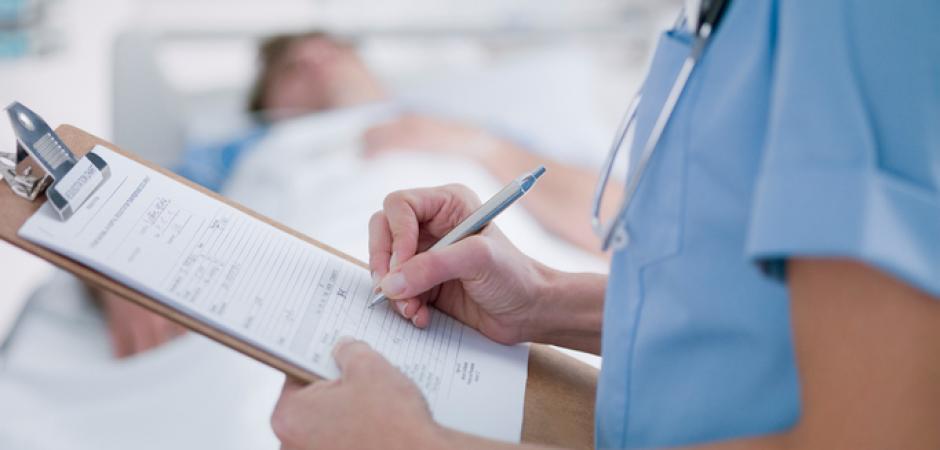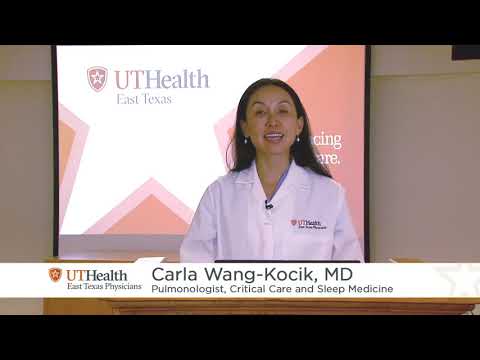
UT Health East Texas Sleep Disorders Center
Sleep is essential to your physical and mental well-being. Adults need between seven and nine hours of sleep a night, yet millions suffer from sleep disorders that deprive them of necessary rest. Sleep disorders may pose significant medical problems such as strain on the heart and lungs that lead to high blood pressure, heart attack or stroke.
The UT Health East Texas Sleep Disorders Center in Henderson is accredited by the American Academy of Sleep medicine.
If you are suffering from a sleep disorder, ask to be referred to UT Health East Texas by your physician or call 903-596-DOCS to begin the referral process.
In many cases an overnight evaluation is needed to learn what is causing the sleep/wake disturbance. Your brain waves, heart rate, snoring, respiration, leg muscle activity and oxygen saturation levels are monitored.
The recording techniques are noninvasive and all electrodes are applied on the skin surface of the areas recorded. The entire recording procedure is painless.
After the electrodes have been applied, you will spend the night in a comfortable bed in the UT Health East Texas Sleep Disorders Center and sleep will be monitored throughout the night.
When the sleep/wake disorder affects your daytime functioning, evaluation of daytime sleepiness is important. You will remain at the center during the day and be given the opportunity to fall asleep at two-hour intervals for a series of four naps. Breakfast and lunch will be provided.
Once a sleep study is completed, your physician will be able to discuss treatment recommendations so you can have a peaceful night’s sleep.
What are sleep disorders?
Sleep can be divided into two types: (REM) sleep and non-REM (NREM) sleep. NREM sleep has four stages of increasingly deep sleep. Stage 1 sleep is the lightest, while stage 4 is the deepest. During normal sleep, you cycle through these types and stages of sleep. If your sleep is repeatedly interrupted and you cannot cycle normally through REM and NREM sleep, you may feel tired, fatigued, and have trouble concentrating and paying attention while awake. Sleepiness puts you at greater risk for driving and other accidents.
Common sleep disorders we treat:
Circadian Rhythm Disorders
Circadian rhythm disorders include jet lag, adjustments to shift work, delayed sleep phase syndrome (you fall asleep and wake up too late) and advanced sleep phase syndrome (you fall asleep and wake up too early).
Insomnia
People who have insomnia do not feel as if they get enough sleep at night. They may have trouble falling asleep or may wake up frequently during the night or early in the morning. Insomnia is a problem if it affects your daytime activities. Insomnia has many possible causes, including stress, anxiety, depression, poor sleep habits, circadian rhythm disorders and taking certain medications.
Pregnancy and Sleep
Women often experience sleepless nights and daytime fatigue in the first and third trimesters of their pregnancy.
Narcolepsy
Narcolepsy is a brain disorder that causes excessive daytime sleepiness. There is sometimes a genetic component, but most patients have no family history of the problem.
Restless Leg Syndrome
In people who have restless legs syndrome, discomfort in the legs and feet peaks during the evening and night. This can delay sleep onset and cause brief awakening during sleep
Night terrors
Night terrors are frightening dreams that arise during REM sleep. They can be caused by stress, anxiety and some drugs.
Sleep apnea
One of the most serious sleep disorders is sleep apnea where you literally stop breathing during sleep. This may happen hundreds of times a night, causing you to awaken slightly to resume breathing. Sleep apnea may lead to high blood pressure, cardiovascular disease, weight problems or other health problems.
Symptoms:
- Excessive snoring
- Awaking with a headache
- Awaking without feeling refreshed
- Daytime sleepiness
- Awaking gasping for breath
- Sudden body movements during sleep
- Weight gain
How is sleep apnea treated?
Sleep apnea is treated with lifestyle changes, mouthpieces, breathing devices and surgery. The goal is to help you restore regular breathing during sleeping and relieve your snoring and/or daytime sleepiness. If you have mild sleep apnea, some changes in daily activities or habits might be all the treatment you need.
- Avoid alcohol and medicines that make you sleepy
- Lose weight if you are overweight or obese.
- Sleep on your side instead of your back to help keep your throat open.
- Keep your nasal passages open at night with nasal sprays or allergy medicines, if needed.
- If you smoke, quit.


